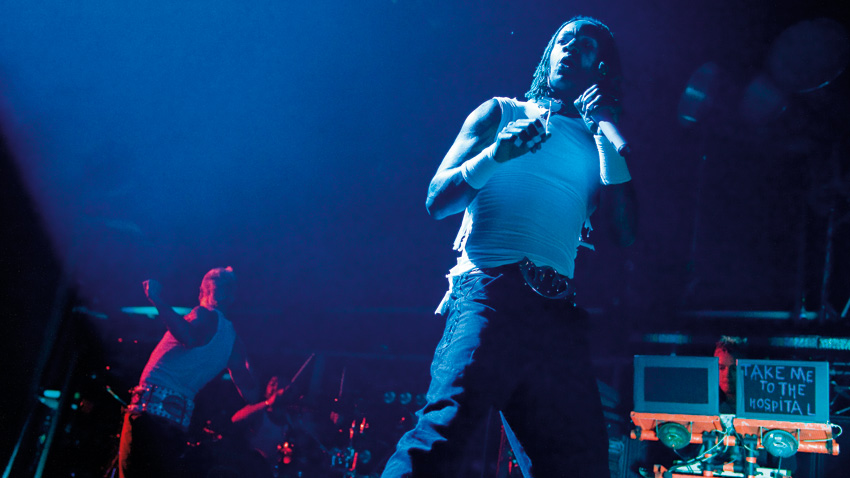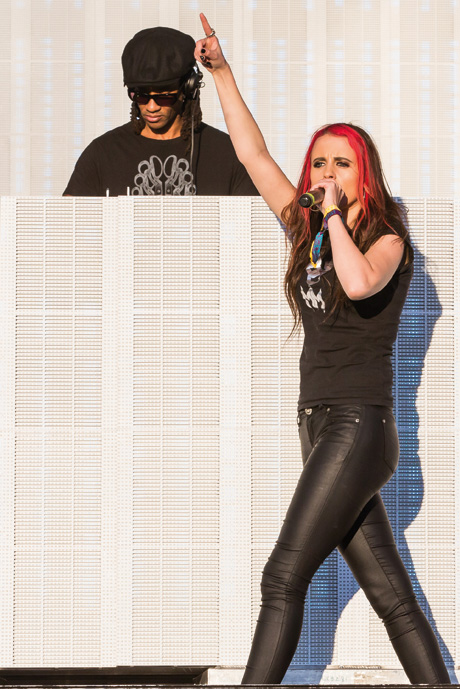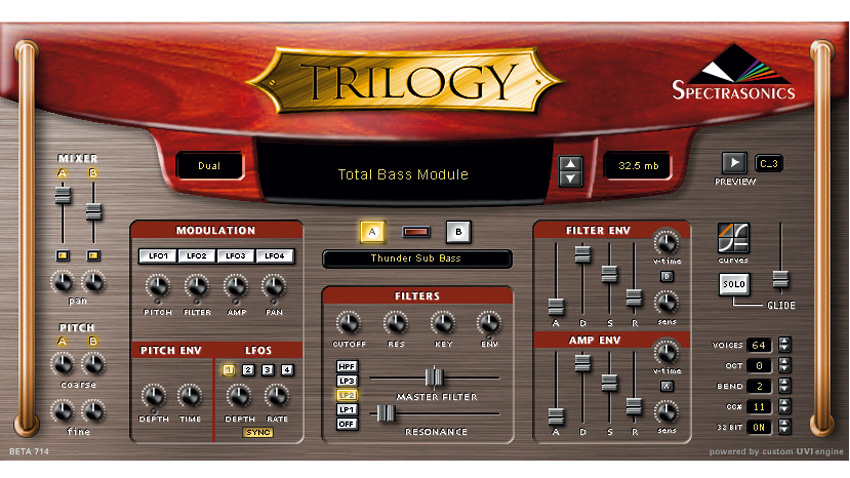Maxim Reality on life beyond The Prodigy with We Are Noize
"I would never do anything to jeopardise the band, but ever since I was 14, I dreamed about having my own studio"

"I've already seen the headlines: 'Maxim leaves The Prodigy to form a new band.' Let me make this very clear: no one's leaving The Prodigy. Me, Liam and Keith are working on a new album at the moment. We Are Noize is just a bunch of mates getting together and making some tunes."
Prodigy MC and co-frontman, Maxim Reality, is smiling broadly as he explains the musical philosophy behind this new trap-influenced side-project, but you get the distinct feeling that some of the misconceptions and comments that accompanied We Are Noize's recent single, World Wide, annoyed the hell out of him.
"People on Twitter were saying, 'Why don't you just stick to your day job?' It's as if I'm not allowed to do anything but be in The Prodigy! Sorry, but that's not how music works. I would never do anything to jeopardise the band, but ever since I was 14, I dreamed about having my own studio. Luckily, I've been able to earn a bit of money over the last few years, and that's given me the chance to build that studio… What's so wrong with me sitting down, writing some music and spitting a few lyrics?"
Do we call We Are Noize a band?
"Nah, it literally is just a few people being creative. There are no rules, there's no set formula… We do whatever feels comfortable. I've been working with [producer] Blaze Billions [who's sitting next to Maxim in their London studio as we speak] for a while, and he understands exactly where I'm coming from. We've got Cianna Blaze MCing and writing lyrics. It's reggae meets dancehall meets trap meets dub meets hip-hop meets dubstep. It's whatever we want it to be!"
Were you consciously looking for a sound that was very different to The Prodigy? Did you feel you had to stamp your own identity on We Are Noize?
"Not really - there was nothing conscious about it. I'm not trying to distance myself from what I do with The Prodigy, but at the same time, I'm not sitting there in my bedroom thinking, 'OK, let's write a new Firestarter'.
Want all the hottest music and gear news, reviews, deals, features and more, direct to your inbox? Sign up here.
"It all started when I was doing a few DJ gigs a couple of years ago. As everybody knows, being a DJ in 2014 means you have to be a producer, too, so, as I was playing out all these tunes, I began to think about making some music of my own.
"I was out in the US quite a lot, listening to tons of trap, and that whole sound really appealed to me. I grew up in the reggae and dub scene as a kid, and I suppose that bottom-end thing with trap immediately sparked my imagination.
"Me and Blaze [Billions] listened to the tracks I'd been playing in my set and said, 'Right, if we want to make our own tunes, where do we take this?' So, we got a fat bassline going, added some 808 kicks… Man, it put a smile on my face. It reminds me of the early days MCing with the sound systems, back when there were no record company A&Rs and nobody worrying about sample clearance. We're simply putting out our tunes. Bang-bang-have-a-listen!"

When did you start MCing?
"About 13 or 14. My brother was on the sound systems in Peterborough, where I grew up, so I was surrounded by music."
And did you immediately start making your own tunes?
"I was writing lyrics, but actually having a computer and some gear came a lot later, after I'd joined The Prodigy. For a good few years, all I was doing was soaking up the music. Listening to Dennis Brown and Big Youth, Johnny Osbourne and Freddie McGregor, Public Enemy and hip-hop. I wasn't interested in the labels; I was just a fan of music. One weekend, I might be MCing at a reggae party in Nottingham, then I'd be at a soul weekender in Prestatyn, at one of the early raves, breakdancing in London or hanging out at Dingwalls, listening to Gilles Peterson play acid jazz. There's actually a picture of me in the background on one of those acid jazz compilations he put out.
"But the one band that really changed things for me was The Specials. Definitely The Specials! When I eventually met Keith and Liam, we were talking about our favourite bands and we realised that the first album we'd all bought was The Specials' debut. We had that shared musical ancestry. Reggae, hip-hop, dub, ska and punk, all mixed in with what was happening in the clubs."
What was your first bit of kit?
"Obviously, Liam had his setup, but for me… probably an Akai sampler. There was a time when all of us in the band went totally gear mad. We'd be buying all the tech magazines and ringing each other up. 'Hey, have you seen that new TC Electronic mastering unit?' 'Have you seen the Boss SE-70?' We went crazy for SE-70s. I must have had five of them at one point. I had the Akai 950, 3000, 6000; great analogue synths like the Moog and the Jupiter-8; every new synth module that came out; and every bit of outboard; every memory card and upgrade. If one of us got a certain synth or effect first, we'd all be round there to have a listen.
"I hope that people reading this will understand how gear can get to you like that… it can become an addiction; a very enjoyable one! I used to love going into my studio and seeing this room full of gear… The smell of all that warm technology."
And today's setup?
"Completely trimmed down to an almost digital, in-the-box studio - I've kept a few of the old analogue synths and one of the Akai samplers, but it never gets switched on.
"I've actually got two setups. In the house, there's a small room with a Mac running Logic and Ableton, and a little set of Genelec powered monitors. Then, there's the big place: another Mac running Logic and Ableton, plus some Genelec 1039s, a Dangerous D-Box and whatever Blaze brings in, of course."
"It's as if I'm not allowed to do anything but be in The Prodigy! Sorry, but that's not how music works."
Blaze Billions: "I'm a Mac, Logic and Ableton man, too. Interface and plugins are all UAD. Man, I love what those guys have done. There are so many different plugins out there promising life-changing sounds and effects, but UAD have just looked back over the last 50-odd years and said, 'Right, what are the bits of gear that everybody wants to use?' Then, they've gone away and created those algorithms.
"Does it sound like the real thing? It's close enough! I've watched multi-million-dollar studios go from rooms full of hardware to UAD setups overnight. And, from an engineering point of view, that's tremendously exciting. Working in a big, fancy studio is great, but what every band wants is the opportunity and the technology to be able to get a 'professional' sound from a home studio. We're living in an age where that's possible."
How did you two meet?
BB: "Mutual friends. I've been involved in the music industry for a long time. I started out in bands, then I was the in-house engineer with Soul II Soul in the early days. I also spent a few years working with a production company in New York [his extensive CV includes Gabrielle, the Eurythmics' Dave Stewart, Will Smith and Ice T]. My thing is sound… I'm happy behind the desk. I listen to a piece of music and I ask myself, 'How can I make a song that sounds like that? How can I get that deep bass? How can I make the hats cut through?'
"Like Maxim, I came up through reggae and dancehall, so we had an instant starting point. We played each other old sound system tracks… 'Hey do you remember this one? And this one?' But, once we got things established, we chucked out the rulebook. That's what I love about working with him. It's not just techno, it's not just trap and it's not just hip-hop. It's whatever we want it to be."

Where and how do We Are Noize tracks start life?
M: "In Ableton. As soon as I saw that program, I fell in love… It's sooo creative. It sort of changed the whole idea of the studio for me. Suddenly, I was writing in hotel rooms and on planes.
"There's a bit of me that still likes to get my hands on hardware and actually play with the knobs and faders - I honestly think that you end up with a more original and inventive sound that way - but there's a crispness and a creative drive with digital that really pushes things forward musically.
"Don't get me wrong; I still listen to the old stuff, and I still love it. I put on a reggae tune from the 70s and I have to just shake my head in disbelief. How did they get so much soul and so much energy and so much power with a bunch of rickety boxes?
BB: "A few years back, I was lucky enough to visit King Tubby's place in Jamaica, and the interesting thing was that this legendary studio had embraced digital technology. They were working in-the-box."
"I used to love going into my studio and seeing this room full of gear… The smell of all that warm technology."
Most people have probably got a picture of a room full of dusty, handmade valve gear and creaking tape decks.
BB: "Oh, they've still got all that stuff, but there are also the young producers coming through who are bringing the new sound with them. That's how music should be! Music should not stand still - it should always be evolving."
M: "Things have changed for everybody. Like I said before, I used to have a room full of hardware, but I was only using about 20% of my stuff. The way Liam works has altered massively over the years The Prodigy have been together. It was a very basic sampler setup in the early days, then we went through the crazy gear stage, Liam did the whole Reason and Pro Tools thing some years ago, and things have moved on again for the new album."
Any idea what it'll sound like?
"Who knows? But it'll be hard!"

Where do most of the We Are Noize, er… noises come from?
BB: "From what's on offer with Ableton and Logic, the full Native Instruments package, plus Maxim's analogue collection, like the Moog and the 808. Obviously, the Moog is great for basses, but so is Massive - especially if you add a bit of Razor and let them fight with each other. And if we're stuck, we can always reach for Trilogy."
There's a lot of nastiness, dirt and distortion in some of the Noize tracks… Is there a distortion plugin of choice?
BB: "What we've tried to do is actually create as much as we can in the original sound. Say we want a distorted lead: I prefer to try and get that straight from the synth, using all the onboard effects. I'd much rather do that than try to create something that has to be tweaked later. If we get to the end of a mix and we think things need a bit more crunch, it's easy enough to add a touch of bitcrushing.
"Yes, there's power in a We Are Noize track, and it needs to sound good in a club setting, but there's a built-in dynamic to trap that means you can't just set everything to maximum distortion."
What's the one bit of kit that We Are Noize couldn't live without?
M: "Ableton, obviously, and the 808… that's two! In terms of an instrument, it's hard to grasp just how important the 808 has been. When I think of club music, I think of that kick drum."
BB: "Can you imagine what would happen to dance music if all the 808 kicks disappeared tomorrow? All you'd be left with is hi-hats and leads. Tracks that just went tssk-tssk-tssk!"
The music business has changed so much since The Prodigy first appeared in 1991. Do you, Liam and Keith ever talk about what it would be like to be just starting out in 2014?
M: "There was certainly a bit more longevity in those early days, and that allowed a band to build up a decent following. There's so much music out there today - so much of it is rubbish! - and it disappears so quickly that it's hard to establish yourself and build a proper career. C'mon, there are bands out there that have only been around a year, and they're putting out greatest hits albums and biographies! Musically, we're living in a fast-food era.
"But the same rules still apply. At the end of the day, it's all about persistence and quality. Keep going, keep putting out decent music, and don't get caught up in any scene. Stick to those basics and you will get noticed."
We Are Noize's EP, Meat, is being released bit by bit online.


Computer Music magazine is the world’s best selling publication dedicated solely to making great music with your Mac or PC computer. Each issue it brings its lucky readers the best in cutting-edge tutorials, need-to-know, expert software reviews and even all the tools you actually need to make great music today, courtesy of our legendary CM Plugin Suite.
